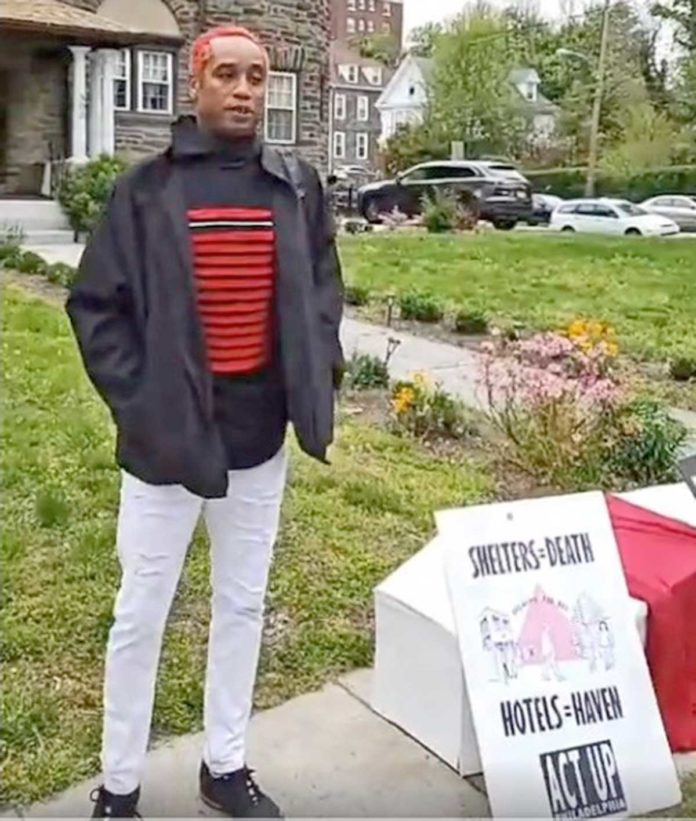Last week, ACT UP in conjunction Black and Brown Worker’s Collective (BBWC), the Coalition to Abolish Death by Incarceration (CADBI), Put People First! PA, and the Philadelphia Community Bail Fund, had a conversation with Philadelphia’s managing director, Brian Abernathy, to discuss safe, non-congregate housing for those experiencing homelessness and those who are being released from prison. The discussion heralds a larger conversation needed on the housing crisis for those most at risk, including LGBTQ youth experiencing homelessness, during COVID-19.
ACT UP is an acronym for the AIDS Coalition to Unleash Power — it has a storied history of nonviolent direct action to address social inequalities associated with people who are at risk of contracting or have contracted HIV. Because ACT UP draws a parallel between the AIDS pandemic and COVID-19, the group has been advocating on behalf of populations most vulnerable to infection and complications due to poverty, systemic racial inequity, lack of healthcare, and most pressingly, lack of safe housing to prevent infection. The group has focused its efforts on educating the city on what appropriate shelters should look like. ACT UP member, Max Ray-Riek, said that the beds in current shelters are staged 18 inches apart, which clearly violates the six-foot social distance rule that’s been touted by the Center for Disease Control (CDC). “This would never have been allowed to happen,” said ACT UP, “in other congregate settings such as private nursing homes or other settings where the residents are not poor, Black and Brown, or houseless people.”
After repeated brush-offs from the city, said Ray-Riek, ACT UP decided to stage a funeral in front of Abernathy’s home. Standing in front of signs that read “Shelters = Death, Hotels = Haven”, one member of ACT UP addressed the crowd: “We’re here today holding a funeral for a homeless man who died in a shelter since the start of COVID-19. He didn’t have to, and it happened strictly because the city decided they were going to break up an encampment and take all those people who had been congregated together and shove them in a shelter. It caused an outbreak of COVID-19 which ended up with one of the residents dying.”
According to ACT UP Philadelphia’s Facebook post, this death came after “the city knew about federal funds to open quarantine spaces, not just for people with positive or presumed-positive COVID-19 diagnoses, but also to move any high-risk individuals out of congregate shelters.” After this political funeral, Abernathy, along with Deputy Managing Director for Health and Human Services Eva Gladstein and the Director of the Office of Homeless Services Liz Hersh, agreed to speak with the group and listen to their demands.
ACT UP’s demands aim to keep the city accountable to timelines for moving vulnerable people to non-congregate shelters such as hotels or the convention center. Vulnerable populations include residents are who 65 and older or those who have immunocompromising preexisting conditions such as HIV or diabetes. ACT UP also demands that the city provide non-congregate shelter to returning citizens from incarceration, those with physical disabilities, women and others who are fleeing from domestic violence, and those with addiction or mental health conditions. The group demands regular testing for all staff and residents at these shelters. As far as the city’s response to or action on these demands, Abernathy declined to comment citing that discussion with the media concerning private negotiations would be “counterproductive.” In early May, however, the city did allow for certain people without a home and folks recently released from prison to move into a Holiday Inn Express as part of an emergency quarantine site program.
ACT UP’s efforts to advocate for those experiencing homelessness particularly affect the LGBTQ community. A University of Chicago report noted that while only 7% of the population identity as LGBTQ, 40% of youth experiencing homelessness identify as LGBTQ. This report also cited that one in 30 adolescents ages 13-17 have experienced homelessness, and one in 10 young adults ages 18-25 have experienced homelessness. Accordingly, LGBTQ youth and young adults are disproportionately affected and suffer from lack of adequate shelter and should be counted among vulnerable populations.
ACT UP’s final demand was for Philadelphia to expand its rent subsidy program to 5,000 additional families in 2020. According to the Philadelphia Housing Authority’s website, over 84,600 people are on a waitlist for housing and, “due to low unit turnover,” PHA is still processing candidates from 2004. The city refers those who are in need of housing or rent assistance to numerous organizations. The organization most friendly to LGBTQ issues is Action Wellness who has traditionally assisted folks with HIV/AIDS. Earlier this month, Action Wellness announced that it had raised $60,000 to aid the “unprecedented need caused by COVID-19.”
Of Abernathy’s reception to the ACT UP’s demands, Ray-Riek said there is a difference between his attitude and actions. “[Abernathy’s] attitude toward [ACT UP] was as someone who is doing their best to deal with a really tough situation, someone who cares very deeply about the plight of Black and Brown and poor Philadelphians. But, the actions he’s been taking don’t live up to the level of concern.” That said, both Abernathy and Ray-Riek noted that discussions concerning issues of safe, non-congregative house will be ongoing.
Ask questions, get answers about COVID-19

